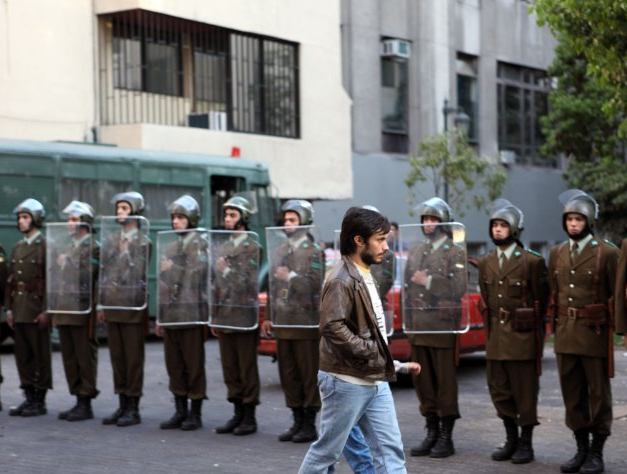After taking Cannes 2012 by storm and snagging an Oscar nomination, director Pablo Larraín’s No is finally stateside. Following the media campaign launched against the Chilean dictator Augusto Pinochet during his 1988 plebiscite election, Larraín’s film also presents a fascinating critique of mainstream media and a harrowing tale of survival and victory under the repressive regime.
In the run up to a straight up-or-down vote to call for new elections in Chile, Pinochet’s regime caved in to international pressure and allowed opposition forces to advertise on state television. No’s fictional central character René Saavedra (Gael García Bernal), runs the underdog “No” campaign advocating new elections. Bucking the advice of anti-regime politicians, he opts for a strategy based on kitschy, modern advertising techniques rather than serious political commentary. Democracy is sold to the public like a can of coke or bottle of perfume, tagged with a catchy jingle and the slogan “Chile, happiness is on its way.”
Larraín adds a personal element to the film by weaving this gritty tale of an oppressive government with the story of René’s crumbling family. Bernal’s dual nature of youthfulness and astounding maturity is perfectly suited to portraying the alternate sides of René’s campaign of “happiness” and his troubled marriage.
Aesthetically, No utilizes the film grain of 1988. Larraín’s decision to use 3/4” Sony U-matic magnetic tape, the standard of news channels in 1980s Chile, allowed for the seamless integration of historical footage with the fictionalized story.
Though not all of the 15-minute segments are shown, much of the original 1988 “Yes” and “No” footage is interspersed throughout, and effectively so. Most of No’s humor derives from the 1980s appeal of the commercials, and yet the satisfaction of knowing their creation process channels deep sincerity.
The film’s interest in the role of media in political elections, be it through sugarcoated jingles or brutal documentary, also crops up as it explores the idea of a creator’s satisfaction with his or her work. René works in television, not just in the “No” campaign. His boss runs the “Yes” campaign, inevitably causing tension; the government keeps a close watch on those involved in the “No” campaign.
A key scene offering resolution between René and his boss Lucho Guzmán, played by the remarkably smug Alfredo Castro, occurs just before the climactic election. Guzmán acknowledges that René’s happiness campaign—using rainbows, pop music, and inflated joy—is strong enough to win. When the results are finally announced, however, René absorbs his triumph solemnly; he knows his future work in media will be similarly superficial, but without holding half the weight.
No, both truthful and visually idiosyncratic, offers substance in twice-removed fiction. It’s rare that a film so authentically reflects another form of media, especially one from another culture and era, but Larraín’s creation succeeds in revealing the truth behind the smoke and mirrors of the Chilean political campaign.





